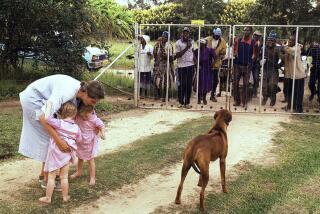Land Grab Blamed in Nation’s Crisis
- Share via
DURBAN, South Africa — Zimbabwe is suffering through its deepest economic crisis since independence in 1980, but officials who gathered at a recent conference here disagreed on how to solve the central problem: forced land redistribution.
If the country’s downward spiral is not reversed, analysts attending the summit on the economy of southern Africa warned, Zimbabwe could drag down the entire region.
“It is commonly agreed that the country faces a deep economic, political and social crisis,” said Morgan Tsvangirai, leader of Zimbabwe’s opposition Movement for Democratic Change. “And it is a crisis that is self-inflicted.”
Officials from the government of Zimbabwean President Robert Mugabe acknowledge that their country is in turmoil. But in his determination not to be seen as pandering to the West, Mugabe has become increasingly belligerent and, as a result, increasingly isolated.
Mugabe and his supporters have complained that the success of a government-backed economic recovery plan aimed at curbing overspending, restoring stability and reviving manufacturing and tourism has been overshadowed by the contentious issue of land redistribution.
Veterans from Zimbabwe’s 1970s war for independence from British colonial rule and other militants have occupied about 900 predominantly white-owned farms with Mugabe’s blessing. The president, a leader of the independence struggle, has argued that the occupations are a justified protest against unfair land distribution.
“It was not our intention that land would become such a pervasive issue, but it has,” Simba Makoni, Zimbabwe’s minister of finance and economic development, told the Durban conference.
Agriculture is the backbone of Zimbabwe’s economy, and the disruptions are accelerating the country’s economic decline, analysts said.
Tobacco production has dropped from 500 million pounds a year to 418 million, according to statistics from Zimbabwe’s Commercial Farmers Union. There has also been a 50% decline in the commercial production of maize. Overall agricultural output is expected to be 30% lower this season compared with last, CFU officials said.
“Cows are being slain because of the inability to manage them due to interference by the war veterans and invaders who continue to harass people,” said CFU President Tim Henwood.
Overall, at least 400 manufacturers closed last year, costing the country nearly 10,000 jobs. Inflation has skyrocketed, and the government recently increased the price of gasoline more than 70%, triggering calls from labor unions for a national strike.
Unemployment is estimated at 60%. Schools and hospitals operate sporadically on shoestring budgets.
The government has identified more than 3,000 white-owned farms--representing nearly half of Zimbabwe’s commercial farmland--for compulsory acquisition and resettlement by thousands of black families.
Mugabe has argued that it is immoral for about 4,500 whites to own the bulk of Zimbabwe’s prime farmland, and he has called on the international community to “recognize the justice of our cause.”
But Western donors have withheld support for the policy, demanding that the government proceed on a willing-buyer, willing-seller basis, with affected farmers being justly compensated.
Government officials say that method was tried in the 1980s but that whites were not willing to give up their land. “There was not enough land available during the willing-buyer, willing-seller [program] to deal with the problem that has now exploded in our faces,” said Makoni, the finance minister.
The CFU said that since the new government resettlement program began in earnest early last year, 400 farmers had voluntarily given up 1.23 million acres. Some of them recognized the need for redistribution; others could no longer cope with the intimidation and disruptions, CFU officials said.
Forty percent of the 400 farm owners were paid 25% of the estimated value of improvements they had made to the land, Henwood said. They are supposed to receive the balance of their buyouts within the next five years.
The CFU recently presented the government with a plan to voluntarily hand over about 2.5 million acres for the resettlement of about 20,000 families. The private sector has agreed to contribute funds for tillage, fertilizers and seeds. The CFU would offer training, technical advice and support to the new farmers, who would be required to continue using the land for commercial agricultural activities, farm officials said.
Makoni said the government welcomed the possibility of friendly cooperation with the commercial farmers, but he added that it is still studying details of the proposal.
“We don’t want to see new programs that will compete with the official resettlement program,” he said. “We would like to see enhancement of the existing program.”
CFU Director David Hasluck acknowledged that morale among commercial farmers is at an all-time low, but he said most are digging in their heels.
“We are doing our best to keep people committed to producing,” he said.
More to Read
Sign up for Essential California
The most important California stories and recommendations in your inbox every morning.
You may occasionally receive promotional content from the Los Angeles Times.














